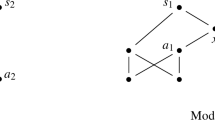Abstract
I propose a new theory of mereology based on a mereological reflection principle. Reflective mereology has natural fusion principles but also refutes certain principles of classical mereology such as Universal Fusion and Fusion Uniqueness. Moreover, reflective mereology avoids Uzquiano’s cardinality problem–the problem that classical mereology tends to clash with set theory when they both quantify over everything. In particular, assuming large cardinals, I construct a model of reflective mereology and second-order ZFCU with Limitation of Size. In the model, classical mereology holds when the quantifiers are restricted to the urelements.
Similar content being viewed by others
Data Availability
Not applicable.
References
Bernays, P. (1976). On the problem of schemata of infinity in axiomatic set theory. In Studies in logic and the foundations of mathematics, vol. 84, pp. 121–172. Elsevier.
Boolos, G. (1985). Nominalist platonism. The Philosophical Review, 94(3), 327–344.
Burgess, J. P. (2004). E pluribus unum: Plural logic and set theory. Philosophia Mathematica, 12(3), 193–221.
Cantor, G. (1883). Ueber unendliche, lineare punktmannichfaltigkeiten. 5. fortsetzung. Mathematische Annalen, 21, 545–591.
Cotnoir, A. J. (2014). Universalism and junk. Australasian Journal of Philosophy, 92(4), 649–664.
Cotnoir, A. (2019). Is weak supplementation analytic? Synthese, 1–17.
Donnelly, M. (2011). Using mereological principles to support metaphysics. Philosophical Quarterly, 61(243), 225–246.
Florio, S., & Linnebo, Ø. (2021). The many and the one: A philosophical study of plural logic. Oxford: Oxford University Press.
Florio, S., & Nicolas, D. (2021). Plurals and mereology. Journal of Philosophical Logic, 50(3), 415–445.
Gödel, K. (1947). What is cantor’s continuum problem? The American Mathematical Monthly, 54(9), 515–525.
Hamkins, J. D., & Kikuchi, M. (2016). Set-theoretic mereology. Logic and Logical Philosophy, 25(3), 285–308.
Hamkins, J. D., & Yao, B. (2022). Reflection in second-order set theory with abundant urelements bi-interprets a supercompact cardinal. The Journal of Symbolic Logic, 1–36.
Hovda, P. (2009). What is classical mereology? Journal of Philosophical Logic, 38(1), 55–82.
Kanamori, A. (2008). The higher infinite: Large cardinals in set theory from their beginnings. Berlin: Springer.
Koellner, P. (2009). On reflection principles. Annals of Pure and Applied Logic, 157(2-3), 206–219.
Lewis, D. (1993). Mathematics in megethology. Philosophia Mathematica, 1(1), 3–23.
Lewis, D. K. (1990). Parts of classes. Oxford: Blackwell.
Maddy, P. (1988). Believing the axioms. i. The Journal of Symbolic Logic, 53(2), 481–511.
Maddy, P. (1988). Believing the axioms. ii. The Journal of Symbolic Logic, 53(3), 736–764.
Roberts, S. (2017). A strong reflection principle. The Review of Symbolic Logic, 10(4), 651–662.
Rosen, G. (1995). Armstrong on classes as states of affairs. Australasian Journal of Philosophy, 73(4), 613–625.
Sider, T. (2007). Parthood. Philosophical Review, 116(1), 51–91.
Simons, P. (1987). Parts: A study in ontology. London: Oxford University Press.
Tait, W. W. (2005). Constructing cardinals from below. The Provenance of Pure Reason: Essays in the Philosophy of Mathematics and its History, 133–154.
Tarski, A. (1956). Foundations of the geometry of solids. Logic, Semantics, Metamathematics, 24–29.
Tarski, A. (1956). On the foundations of boolean algebra. Logic, Semantics, Metamathematics, 320–41.
Tiles, M., & Bostock, D. (1981). Logic and arithmetic. vol. 2: Rational and irrational numbers. Philosophical Quarterly, 31(124), 277.
Uzquiano, G. (2006). The price of universality. Philosophical Studies, 129(1), 137–169.
Uzquiano, G. (2006). Unrestricted unrestricted quantification: The cardinal problem of absolute generality. Absolute Generality, 305–32.
Varzi, A. C. (2008). The extensionality of parthood and composition. Philosophical Quarterly, 58(230), 108–133.
Walsh, S., & Tim Button. (2018). Philosophy and model theory. Oxford: Oxford University Press.
Yao, B. (2022). Reflection principles and second-order choice principles with urelements. Annals of Pure and Applied Logic, 173(4), 103073.
Acknowledgments
The author would like to thank Patricia Blanchette, Joel David Hamkins, Daniel Nolan, Agustín Rayo, and an anonymous referee for their helpful comments on earlier drafts of this paper.
Funding
No funding received.
Author information
Authors and Affiliations
Contributions
Not applicable.
Corresponding author
Ethics declarations
Ethics approval and consent to participate
Not applicable.
Competing interests
There are no competing financial interests or personal relationships that could have appeared to influence the work reported in this paper.
Additional information
Publisher’s Note
Springer Nature remains neutral with regard to jurisdictional claims in published maps and institutional affiliations.
Rights and permissions
Springer Nature or its licensor (e.g. a society or other partner) holds exclusive rights to this article under a publishing agreement with the author(s) or other rightsholder(s); author self-archiving of the accepted manuscript version of this article is solely governed by the terms of such publishing agreement and applicable law.
About this article
Cite this article
Yao, B. Reflective Mereology. J Philos Logic 52, 1171–1196 (2023). https://doi.org/10.1007/s10992-023-09702-x
Received:
Accepted:
Published:
Issue Date:
DOI: https://doi.org/10.1007/s10992-023-09702-x




